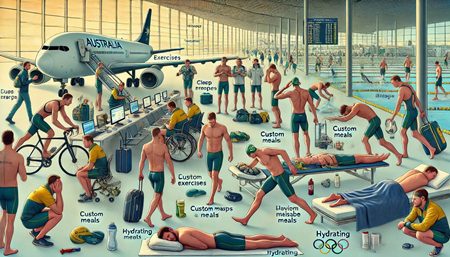 As the world gears up for the Paris 2024 Olympics, a meticulous and high-stakes operation is underway behind the scenes. The often-unsung heroes of this grand spectacle are the travel managers who ensure that athletes, their support teams, and crucial equipment arrive in peak condition. Among the leaders in this field is Flight Centre Travel Group’s Stage and Screen, which has been orchestrating seamless travel for Australia’s top swimmers.
As the world gears up for the Paris 2024 Olympics, a meticulous and high-stakes operation is underway behind the scenes. The often-unsung heroes of this grand spectacle are the travel managers who ensure that athletes, their support teams, and crucial equipment arrive in peak condition. Among the leaders in this field is Flight Centre Travel Group’s Stage and Screen, which has been orchestrating seamless travel for Australia’s top swimmers.
This year’s preparation is marked by unparalleled precision and strategic planning for Australia’s elite swimmers, known as the Dolphins. Stage and Screen have been at the forefront of these efforts, managing Swimming Australia’s travel since 2020. This year, they have already organized travel for the Australian Swimming Championships in April and the Australian Swimming Trials in June. Their focus is now on the Olympic swimming events, set to begin on July 27 at La Défense Arena in Paris, where Australia secured its first swimming gold medal in 1900.
This summer, 44 Australian swimmers are poised to make history. Among them are stars like Ariarne Titmus, Kaylee McKeown, and Cam McEvoy, each of whom has spent years honing their skills for this moment. With such high stakes, every detail of their travel must be meticulously planned and executed.
The Australian Olympic Committee (AOC) handles the overall logistics of getting athletes to and from the Games, but the detailed work of ensuring athletes, their equipment, and support teams are transported without a hitch falls to Stage and Screen. Adam Moon, General Manager of Stage and Screen, explains the complexity of this task. “Getting athletes, their equipment, and support crews to the track, field, rink, or pool requires an orchestra that operates behind the curtains, no matter if it’s an international event like the Games or a national tournament,” he says.
Richard McInnes from the Australian Sporting Commission echoes this sentiment. “Travel managers are the unsung heroes of getting thousands of people to an Olympics in top shape. This month, up to 10,500 athletes and support staff will descend on the French capital,” he notes. The stakes are high, and even a minor hiccup can spell disaster. “Managing the timing of flights, adjusting to different time zones, and optimizing the time on the ground can be very stressful. If something goes wrong, like lost luggage, it can be disastrous for athletes who rely on bespoke equipment,” McInnes adds.
For the Dolphins, minimizing disruptions is key. Jodie Hawkins, Executive General Manager Commercial of Swimming Australia, emphasizes the importance of meticulous planning. “We always set the training schedules first. We then work with Stage and Screen on the best accommodation nearby and finalize travel dates and flight details after this,” she says. The goal is to acclimate to the time zone and ensure athletes are in the best possible shape before the competition begins.
Swimming Australia and Stage and Screen collaboration is crucial for the athletes’ success. “Athletes and coaches are habitual people. They like routine and appreciate schedules that are closely followed. Making our travel as short as possible to destinations and ensuring things run smoothly is vital. This allows our teams to focus on training and competition with minimal disruption,” Hawkins explains.
Moon highlights the broader impact of their work. “Travel management companies play one of the biggest supporting roles in getting corporates, media, athletes, and crews to a quadrennial event like the Games. Given the size and excitement surrounding Paris, this month is set to be a record breaker,” he says. With the Tokyo Games closed due to the pandemic, record-setting spectators are expected in Paris, adding to the logistical challenges.
To ensure optimal performance, the Dolphins adhere to a set of pre-travel and in-flight strategies:
- Pre-flight stretching: Engaging in exercises to minimize fatigue.
- Compression gear: Wearing compression socks or leggings before boarding.
- Adaptability: Staying flexible to handle flight delays and transportation disruptions.
- Movement on the plane: Walking every 30 minutes and using props to support joints.
- Resting on the plane: Adjusting sleep times to the destination’s time zone, using eye masks and noise-cancelling headphones.
- Adjusting the body clock: Follow a jetlag protocol, maintain a regular sleep routine, and avoid caffeine in the afternoon.
- Food and hydration: Upon arrival, adopt a normal meal pattern, eat carbohydrates to aid sleep, and stay hydrated.
- Arrival routine: Staying active in sunlight and adjusting to the new time zone by staying awake until bedtime.
These tactics are part of a broader strategy to ensure athletes arrive in peak physical and mental condition, ready to compete and excel.
As the Paris Games approach, the role of travel managers like those at Stage and Screen becomes ever more critical. Their work behind the scenes ensures that Australia’s athletes can focus on what they do best – striving for gold and making their country proud. With every detail meticulously planned and executed, the Dolphins are set to continue their storied legacy of Olympic success.
In the high-stakes world of Olympic travel logistics, travel managers’ expertise and dedication are invaluable. They are the invisible hands guiding athletes to their moment of glory, ensuring that nothing stands in the way of their pursuit of excellence.
Written by: Yves Thomas




















